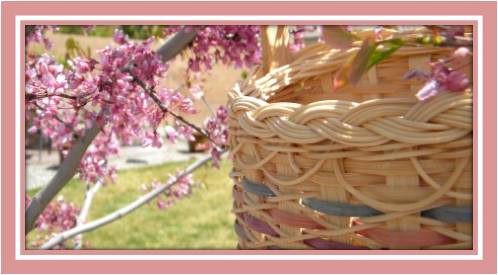Yesterday I received an e-mail from a reader and it is a question that I have been asked from time to time and I thought that perhaps others of you might have wondered the same thing so here it is:
Hey, Nancy!The short answer is yes there are pesticides sprayed on the reed during the processing of it as well as for transport across ocean. Now I'm not a chemist and I have not chemically tested the reed, but I would imagine that a fair amount of those pesticides are worn off and washed off as you soak the reed before using. This is one reason why you should not let your pet drink your soaking water. (For some reason it seems that dogs really like drinking reed water and they should not be allowed to do this) Have you ever soaked your reed and felt something, not gummy, but a substance on the reed as you take it out of the water? Some of that is from the oils in the machine as they cut the reed but some of that feeling or substance is from what has been sprayed on the reed. I think you probably wipe most of it off with your towel.
I've got another question for you. I was told by someone in my guild that basket reed has toxins in it, and it should not be used for baskets that will at some time be in contact with food. At least half of the baskets I've been weaving over the last 2 months are kitchen baskets, i.e., 2 pie baskets, bread warmers, cookie keepers, silverware baskets, salt & pepper holders, coffee filter baskets, etc. Is this true? Is basket reed poisonous?
That said, lets look at what we put in our baskets that we use in the kitchen. For the remainder of this answer I'm going to refer to the results from Adam and Jamie and the interesting "Mythbusters" TV show.
Mythbusters did an episode where they talked about the 5 second rule...Drops on the floor and you pick it up and eat it within 5 seconds you are ok, no germs. Their results of the experiment were if something dry like an M&M dropped on the floor (providing the floor itself wasn't wet) so a dry M&M on dry floor then you can pick it up, eat it, and be basically germ free. Wet substances are another story. You drop a slice of bologna on the floor it picks up tons of germs instantly. Don't eat it! Of course things are in your basket much longer than 5 seconds but I feel the same dry against dry rule applies.
Speaking for myself and what I put in my baskets, food related, are dry and I put these things in a dry basket so dry on dry. I would never put something wet in my basket. Most of these items that I put in my basket have some sort of a covering such as tea bags are in a basket at my house and my Jello boxes are in another basket. My bananas, oranges and apples are in a basket. The apples I'll wash before we eat them. (I've read where you should wash your bananas and oranges too but I don't do that) Speaking for myself when I put bread and cookies in a basket I put a paper towel or napkin in the basket first to line it. (Guess I was more concerned of the oil from the cookies staining and spotting my basket) I too have coffee filters in a basket with my coffee but again that is dry on dry. Same goes with silverware. As far as your pie basket is concerned, a small edge of the pie might touch the basket, but IMHO it is such as small amount I personally would not be concerned. Plus whatever on the pie that became contaminated from the basket is probably stuck on the basket anyway as you removed the pie.
Did you know that many, many household items that are shipped over here from overseas have been sprayed with pesticides? Yes it is true. I never ever want to discount anyone's concerns regarding this topic and my answers come from books I've read so I'm only giving you my best answer. If you are still concerned, use a liner of some sort for all baskets that come in contact with food products. With your coffee filter basket, just don't use the very bottom filter and use that bottom filter as a liner. Basically I'm going to tell you to use your best judgement with all this.
A similar question I've been asked in the past is about using dyed reed and the dyed reed coming into contact with food. Same applies with dry on dry as mentioned above. My personal feelings with this, as I use Rit dye, are as follows. Rit dye is for fabric. We use cloth napkins and such that have been dyed, so I have never been concerned about my dyed reed possibly touching food products either.
Perhaps some of you readers have heard other things regarding this topic. Please leave a comment and let me and others know.
Super question and I appreciate you asking.
Baskets of Blessings Everyone,
Nancy





7 comments:
There is a good article at the Country Seat about how reed and cane is processed, including any chemical treatments used. Here's the URL:
http://www.countryseat.com/basketryreed.htm
Fascinating! It never would have occurred to me to ask such a question. Thanks for posting this!
Thank you for answer this question, and to Juliana for the link! I have learned something today!
Have a great day
Rose
Nancy: I absolutely love you! Thank you for such a thorough answer to my question! I was so afraid that I was going to have to throw out half of the baskets I've woven lately. As the saying goes: Informed consumers are safe consumers. Apparently, the same is true for weavers. :)
The article at the County Seat was really interesting. I think I may write up a little flyer about both the processing of reed and safety measures concerning reed, and include it with my basket sales. There is so much misinformation out there, and I am glad these issues have been appropriately addressed here.
Best wishes, and thanks!
Good question and wonderful answer!
A little off topic but...
Some of you may already do this but you might want to add tips on care of your baskets to your tags and/or flyers as well. How to clean and dry etc. Just a thought.
That's a great idea...I always kept a little brochure I made up with care and cleaning tips with the baskets I was selling.
One of the very first things I ever learned about weaving was , "Never put reed in your mouth." Doesn't taste good anyway, which is why I gave up the clarinet years ago!
As a horticulturist, let me say that exposing reed to the sun for several weeks would also aid in the break down and reduction of some pesticides and herbicides. It all depends on which chemicals were used.
Post a Comment